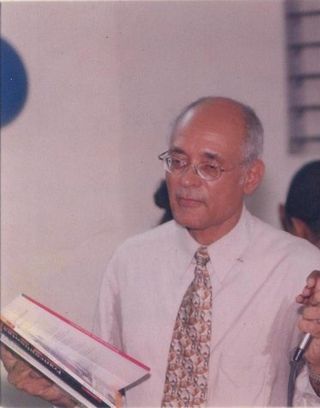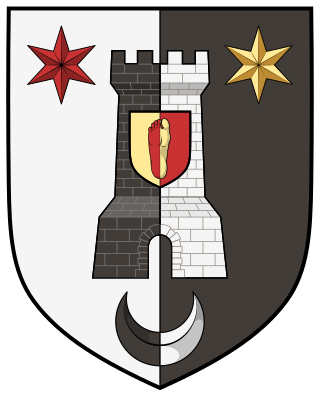
Albert Auguste Gabriel Hanotaux, known as Gabriel Hanotaux was a French statesman and historian.

Liberté, égalité, fraternité, French for 'liberty, equality, fraternity', is the national motto of France and the Republic of Haiti, and is an example of a tripartite motto. Although it finds its origins in the French Revolution, it was then only one motto among others and was not institutionalized until the Third Republic at the end of the 19th century. Debates concerning the compatibility and order of the three terms began at the same time as the Revolution. It is also the motto of the Grand Orient and the Grande Loge de France.

Frankétienne is a Haitian writer, poet, playwright, painter, musician, activist and intellectual. He is recognized as one of Haiti's leading writers and playwrights of both French and Haitian Creole, and is "known as the father of Haitian letters". As a painter, he is known for his colorful abstract works, often emphasizing the colors blue and red. He was a candidate for the Nobel Prize in Literature in 2009, made a Commander of the Ordre des Arts et Lettres, and was named UNESCO Artist for Peace in 2010.

Marie-Louis-Antoine-Gaston Boissier, French classical scholar, and secretary of the Académie française, was born at Nîmes.

Alain Bonnet, known as Alain Soral, is a far-right Franco-Swiss ideologue, essayist, filmmaker and actor.

André Siegfried was a French academic, geographer and political writer best known to English speakers for his commentaries on American, Canadian, and British politics.
Demesvar Delorme was a Haitian theoretician, writer, and politician. Born in Cap-Haïtien, he participated in Sylvain Salnave's failed rebellion against President Fabre Geffrard in 1865. After the fall of Geffrard and Salnave's election as President of Haiti in 1867, he was appointed Minister of External Relations and Minister of Public Education and Cults.

Joseph Auguste Anténor Firmin, better known as Anténor Firmin, was a Haitian barrister and philosopher, pioneering anthropologist, journalist, and politician. Firmin is best known for his book De l'égalité des races humaines, which was published in 1885 as a rebuttal to French writer Count Arthur de Gobineau's work Essai sur l'inégalité des races humaines. Gobineau's book asserted the superiority of the Aryan race and the inferiority of Blacks and other people of color. Firmin's book argued the opposite, that "all men are endowed with the same qualities and the same faults, without distinction of color or anatomical form. The races are equal". He was marginalized at the time for his beliefs that all human races were equal.
Magoua is a particular dialect of basilectal Quebec French spoken in the Trois-Rivières area, between Trois-Rivières and Maskinongé. Long before a military fort was constructed there, Trois-Rivières became in 1615 the first stronghold of the coureurs des bois outside the city of Québec. Magoua is the ethnonym applied to their descendants in the area. Magoua is the most conservative of all Quebec French varieties, including Joual. It preserves the sontaient ("étaient") characteristic of Métis French and Cajun French, has a creole-like past tense particle tà and has old present-tense contraction of a former verb "to be" that behave in the same manner as subject clitics.
Gary Klang, is a Haitian-Canadian poet and novelist. Since 2007, he is the president of the prestigious "Conseil des Écrivains francophones d'Amérique". Klang's work is very rich. It includes novels, poetry, short stories and essays. On July 14, 2000, "l'Union Française à Montréal" chose Gary as the promoter of the French national holiday marking the storming of the Bastille. The same day, the same French Union participated in the launch of his collection of verses "La terre est vide comme une étoile". Gary Klang is also a member of the "Association des Ecrivains Québécois (UNEQ)", a member of the "Association des Ecrivains de langue française" and of the PEN Club of Montreal. He was nominated for the Haitian grand Literary Prize of 2004, together with Edwidge Danticat, René Depestre, Frankétienne, Dany Laferrière, Josaphat-Robert Large and Leslie Manigat.

Guillaume-Charles Faipoult was a French aristocrat, soldier and politician who was Minister of Finance during the French Revolution. He then represented France in Italy, where he organized the newly formed republics. During the First French Empire he was prefect of the Scheldt department, and then Minister of Finance in Spain under Joseph Bonaparte. Faipoult was prefect of Saône-et-Loire during the Hundred Days.
Fritz Alphonse Jean is a Haitian economist, politician and writer who served as governor of the Banque de la République d'Haïti from 1998 until 2001. Since 2012, he is the President of the Chamber of Commerce, Industry and Professions of Nord-Est. and is part of the national commemoration committee of the 100th anniversary of the United States occupation of Haiti. He was elected by the Montana Consensus as Provisional President of Haiti on January 30, 2022.

Suzanne Comhaire-Sylvain was the first woman Haitian anthropologist. Suzanne Comhaire-Sylvain was a student of Bronisław Malinowski who worked in 1949 with Alfred Métraux, and participated in a UNESCO project in Haiti. She married Jean Comhaire, a Belgian who headed the Anthropology Department of University of Nsukka. Subsequently, she worked in Africa.

Emmelie Prophète, also known as Emmelie Prophète Milcé, is a Haitian writer and diplomat. As of November 2022, she is serving as justice minister of Haiti.

Antoine Jourde was a French politician. He was born into a peasant family and worked in an umbrella factory, a flower shop and for a wine dealer among other jobs. He was elected as a Boulangist and socialist, and was the author or co-author of over 20 proposed laws. During the Dreyfus affair he was against Dreyfus at first, but changed his mind when evidence of forgery of evidence against Dreyfus emerged. He was active in the French Freemasonry movement.

Georges Lacour-Gayet was a French historian who taught at the École Navale and the École Polytechnique. His books on the French navy under Louis XV and Louis XVI are much-quoted and were considered references when published, although they betray his patriotic bias. His master work was a four-volume biography of Talleyrand.
Jean-Jacques d'Esparbès was a French soldier who was briefly Governor of Saint-Domingue in 1792 during the French Revolution.

Pierre Vernet was a Haitian linguist and lexicographer, who created the Center for Applied Linguistics in Port-au-Prince. He was instrumental in standardizing Haitian Creole (Krèyol) spelling as an aid to literacy, and the elaboration of French-Krèyol lexicons of terminology. He also published dictionaries with Alain Bentolila and with Bryant Freeman.

The Vandive family was a Parisian branch of the Van Dievoetfamily from Brussels, descended from goldsmith Philippe Van Dievoet, the elder brother of famous Brussels sculptor Peter Van Dievoet. The family were first bourgeois of Paris before becoming part of the French nobility.














